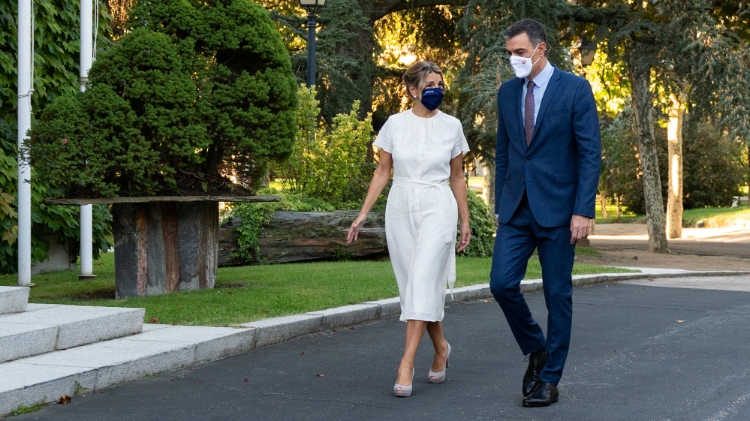Ángel Collado
After the ceremony of exaltation of unity around the figure of Pedro Sánchez at the last PSOE congress, his partners and allies in the Government have taken it upon themselves to confront the Socialists with the reality of their precariousness in power and have even provoked some to talk of a possible early election.
The internal but public squabbles in the Executive (now over labour legislation), the new direct attacks on Justice from Podemos and the indiscretions of the ‘Batasunos’ over the cost of their support (benefits for imprisoned terrorists) frame the paralysis of a Cabinet with no other horizon than to push through the General State Budget.
Alfredo Pérez Rubalcaba, Sánchez’s predecessor at the head of the PSOE who was honoured at the socialist congress, defined Sanchez’s current formula for residing in La Moncloa Palace as a ‘Frankenstein Government’. The former minister, with Felipe González and with José Luis Rodríguez Zapatero, thus referred to the political monster that could emerge from the alliance of the Socialists, the extreme left-wing populists of Pablo Iglesias, plus the addition of the Catalan independentistas and the Basque political heirs of ETA.
In less than a week, all the pieces of the political conglomerate that brought Sánchez to power in June 2018 have justified the fears expressed at the time by the veteran socialist leader who died in May 2019.
To ensure the continuity of the coalition, the president of the Government took Podemos’ positions against those defended by PSOE ministers on the housing law or the increase in the minimum wage. But now, the vice-president and minister of Labour appointed by Iglesias, Yolanda Díaz, is demanding absolute control and the leading role in the always announced and postponed labour counter-reform, the repeal of the current legislation on the matter approved in 2012 by the first government of Mariano Rajoy.
Sánchez promised the same, but dragged his feet and even his economic vice-president, Nadia Calviño, guaranteed before Brussels that the Spanish government would not take steps backwards in modernising and making the labour market more flexible in order to satisfy the unions. Díaz has been working on the exact opposite since last March and capped off a dark week for the coalition government with her presence at the Congress of Comisiones Obreras, harangued with cries of “president, president”, by taking it for granted that she will repeal the labour legislation.
The central trade unions aspire to regain control over collective bargaining, which they had before the economic crisis. The added problem for Sánchez is that the arrival of European funds also depends on the labour reform he undertakes not going against the competitiveness and job creation of the Spanish economy.
The clash between Calviño and Díaz continues to escalate as the Executive puts its immediate future at stake in the processing of the Budget, an objective for which it needs the block support of its most fixed allies: the pro-independence ERC, who usually go hand in hand with Bildu, the PNV and some MPs from regional left-wing groups. Only with all of them can it surpass the figure of 176 MPs that would allow it to push through the state accounts.
Nor do the indiscretions of Arnaldo Otegi, former ETA gunman and now Bildu spokesman, about the price of his parliamentary support for the PSOE and Podemos government -prison benefits for imprisoned terrorists- benefit the government’s plans. Sánchez normalises relations with the heir of Batasuna (the political wing of the gang) as part of his alliance with the pro-independence left.
The case of Podemos’ new attacks on the judiciary, now the Supreme Court, over the conviction of MP Alberto Rodríguez for kicking a policeman is another example of the anti-systemic ingredient and contempt for the separation of powers that nestles in the other party of the coalition. Sánchez remains silent, despite the row.
The spectacle of the “Frankenstein Government” is encouraging the idea in Congress that the budget process could be traumatic for Sánchez and his partners, both because of internal fights and because of the political debt required by his allies. And even more so if the deterioration of the economy (inflation and energy prices) leaves the forecasts of the State Accounts themselves in doubt as they go along. It will not be a budget to guarantee the legislature and Iván Redondo, Sánchez’s defenestrated super advisor, has been the first to insinuate that from March onwards there could be new elections at any time.






